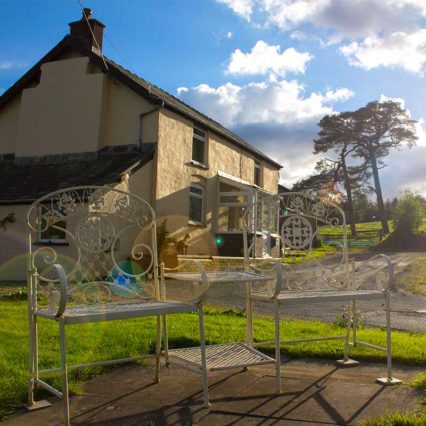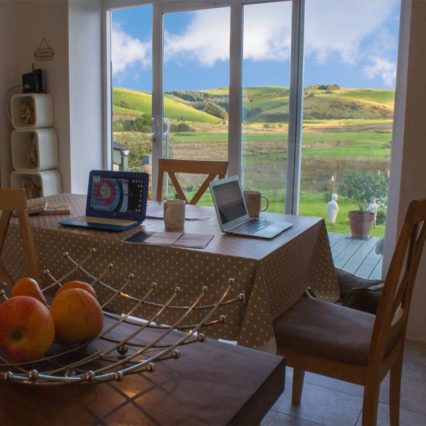Chris Clement-Green charts her life as a writer, and how it led to running a writer’s retreat in the hills of Powys.
It is perhaps a little arrogant to state that creative writing has never been a source of fear for me, although this convivial state of affairs could well be a case of ignorance being bliss. I have never sweated and toiled over the formation of a single sentence and, as you will see, have always been prepared to start them with a conjunction. Punctuation remains a minor nemesis and I do inflict on myself the occasional struggle over comma placement or semi-colon choice. Although I now know when I’m splitting an infinitive I simply don’t care, and when I recently found myself Googling ‘dangling modifier’ (which had cropped up in an online writers’ group), I decided it is quite possible to communicate creatively without such suffocating knowledge. (You will also note my unfashionable use of parentheses or, as I prefer to call them, brackets.)
 As my childhood was generally a happy one, I have never combed through the detritus of my formative years for cathartic purposes, nor have I ever had to search for inspiration at the bottom of a glass or bottle. Writing has always been an activity to be enjoyed, never endured, and although my short stories have won the odd prize this is a comforting rather than important fact. I defiantly characterise myself as a cheerful troubadour, a teller of tales, who actively shuns the tortured life of a grammatically correct potential literary giant.
As my childhood was generally a happy one, I have never combed through the detritus of my formative years for cathartic purposes, nor have I ever had to search for inspiration at the bottom of a glass or bottle. Writing has always been an activity to be enjoyed, never endured, and although my short stories have won the odd prize this is a comforting rather than important fact. I defiantly characterise myself as a cheerful troubadour, a teller of tales, who actively shuns the tortured life of a grammatically correct potential literary giant.
Because of the life I’ve led I’ve never run out of ideas and never suffered from the cliché of writer’s block. I was flown from Liverpool to Africa in a prop-engined plane at the record breaking age of twenty-four hours old, and subsequently spent the majority of my working life as a competitive rider and/or investigating serious and organised crime. So, although the quality of what I write can take a nosedive, the blank page has only ever been a source of excitement for me.
But now, as I start out on my latest writing adventure – setting up a writing school amidst the beautiful mountains lakes and river of mid-Wales – I am experiencing real terror for the first time. Residential writers will expect to be fed and fed well, and I don’t cook. My friends call me the prick and ping queen (if it doesn’t go in the microwave it doesn’t get cooked). The same friends awarded me a plaque which states I only have a kitchen because it came with the house, which sits alongside another declaring that chocolate is not just a breakfast food. These friends also ensure that I eat with them at least once a week, when I’m force-fed fresh vegetables on the promise of a cream-based dessert.
It took my first husband six months of living off cheese sandwiches and cornflakes before he felt motivated enough to switch on the oven. I was working as a riding instructor at the time and living off chocolate, eight to ten bars a day. I’m not sure if it was the stable work and riding that kept me the slimmest I’ve ever been, but my complexion was moon-like –lunar grey and cratered. My second husband learnt to cook within six weeks of moving in, and I confess to never suffering any gender-guilt as I allowed my men to develop new culinary skills. They cooked, I ate; it seemed a fair distribution of effort to me.
Before we agreed on an amicable parting of the ways, hubby number two had begun to revel in the role of domestic god, bringing to it the organisation and commitment you’d expect from a retired chief fire officer. Such commitment extended to undertaking the weekly food shop and, if I was unavoidably present, I would accompany him as far as the magazine and sandwich racks at the supermarket’s entrance. There I would grab a copy of Horse and Hound and a packet of crisps, before returning to the car to eat, read and wait, while hubby spent up to an hour (a whole hour!) pushing a wire trolley up and down the never-ending aisles, ticking off the items on his carefully thought through list.
 The truth is food bores me. I can’t think about it until I’m hungry and when I’m hungry I want to eat, not cook. When I surface from the sexist blood and gore of my latest police procedural, or the pull of my main character’s lilac eyes in a fantasy short story, I want to pick food up and put it in my mouth; instant gratification, no effort, no thought. I don’t want to go shopping for it days in advance, I don’t want to think about whole menus en masse and I certainly don’t want to stop what I’m doing (usually writing), in order to warm up an oven and put something in it that will entail several more interruptions to check on its snail-like progress. Life is just too short!
The truth is food bores me. I can’t think about it until I’m hungry and when I’m hungry I want to eat, not cook. When I surface from the sexist blood and gore of my latest police procedural, or the pull of my main character’s lilac eyes in a fantasy short story, I want to pick food up and put it in my mouth; instant gratification, no effort, no thought. I don’t want to go shopping for it days in advance, I don’t want to think about whole menus en masse and I certainly don’t want to stop what I’m doing (usually writing), in order to warm up an oven and put something in it that will entail several more interruptions to check on its snail-like progress. Life is just too short!
This ambivalence towards food and cooking probably started when I moved to big school; one of my first cookery lessons involved the making of a small loaf. Returning from a period of double-games, we all rushed back to the classroom to examine the results of our collective endeavours. Miss Gorge (I’m not making that up) had removed our efforts from the oven while we clashed hockey sticks, but my work-station remained ominously empty. When I asked after my creation, this less than supportive teacher merely glanced down at the floor. There, by the door, sat my loaf; perfectly formed but dense enough to make a rather effective door-stop. Against this background of childhood culinary trauma, it might surprise you to know that I gained an A in O’level home economics.
When selecting my O’level subjects, a conflicting timetable had forced a choice between Latin and cookery. I was equally appalling at both subjects but plumped for the latter on the basis I might get to eat something – although obviously cooked by someone else. I have a clear memory of sitting alone in a prefabricated classroom in 1975, undertaking the theory part of the exam. This involved selecting one of three scenarios and preparing an appropriate menu. I sat alone because I had broken my right arm falling off another horse and was therefore using my left hand, which entitled me to extra time. (The cast was due off before the practical.) My exam concentration was broken by Miss Gorge’s more supportive replacement jumping up and down outside the classroom window, waving a copy of the exam paper. She’d circled scenario three in thick red felt pen. This scenario involved two elderly ladies coming to dinner. I could, at a stretch, manage a fairly decent fish-pie and a surprisingly good egg-custard; both (supposedly) easily digestible dishes ideal for pensioners. I gave my teacher the thumbs up, acknowledging I’d already registered this god-send of an opportunity.
But the practical exam was not without its pitfalls. Placing the finished pie under the grill in order to brown its potato top, I got distracted by my success and, as I wiped down surfaces, the potato turned from golden brown to charcoal black. The work-station bins were checked as part of the marking process so, while the examiner was examining someone else’s bin, I hastily scraped the burnt potato into the back of the cutlery draw, before replacing the pie under the grill for a second attempt. My A-grade showed this deception was successful.
But there will be no deceiving paying writing-guests who come on retreat to The Welsh Writing Shed – I’ve named it that because there’s a large shed attached to the house that I’ve converted into a lovely writing space with stunning views. And, over the years, I have amassed recipe books full of well-tried workshop-exercises which inspire and nourish the creative mind. But my dilemma remains – how the fuck am I going to feed the creative body?
 I can manage breakfast. I’m quite capable of purchasing a selection of cereals, yogurts and in-date milk. I can also put bread in a toaster and provide various kinds of spread and jams. I can even, if necessary, grill bacon and boil or fry an egg (although poaching remains a mystery). For lunch I can heat up someone else’s homemade soup and construct delicious sandwiches with shop-brought crusty bread or, better still, I can provide the bread and fillings and let my writers continue their creativity. I also possess a lifetime’s experience of buying good quality cakes and biscuits and brewing and drinking copious amounts of tea and coffee. But a proper three course evening meal, with wine, is considered by all a de rigueur end to a perfect creative day.
I can manage breakfast. I’m quite capable of purchasing a selection of cereals, yogurts and in-date milk. I can also put bread in a toaster and provide various kinds of spread and jams. I can even, if necessary, grill bacon and boil or fry an egg (although poaching remains a mystery). For lunch I can heat up someone else’s homemade soup and construct delicious sandwiches with shop-brought crusty bread or, better still, I can provide the bread and fillings and let my writers continue their creativity. I also possess a lifetime’s experience of buying good quality cakes and biscuits and brewing and drinking copious amounts of tea and coffee. But a proper three course evening meal, with wine, is considered by all a de rigueur end to a perfect creative day.
Despite being a non-drinker (I’ve always preferred to waste my cash and calories on chocolate), I follow the social constraints of taking wine to dinner-parties. I also go to the trouble of remembering if my hosts are red, white or pink people, before visiting the relevant colour-coded section in the supermarket, where I base my selection on price. I look for ten or twelve pound bottles that are currently on offer for five or six, working on the assumption that the original price must reflect the quality. This practice seems to have served me well, in that my offerings are always drunk on the night and never surreptitiously placed in a kitchen cupboard for recycling to a school raffle; so I plan to follow this method in The Shed. I’m also prepared to splash out on the odd bottle of port and perhaps brandy, in an effort to oil literary dinner-table conversation.
But the panic-elephant looms large. Every time I pass through the dining room, there it is, squatting stubbornly on the empty table like a belligerent center-piece – what about the evening meal? After much soul-searching I have calculated four options. One, give up the idea of residential writing guests – no way, I want the company and creative buzz. Two, learn to cook – never going to happen; as I’ve said, life’s too short. Three, employ a cook – I will if I can find one near enough with both the inclination and ability, and finally four – probably my best option – adjourn to the village pub and let them worry about the bloody food. So, a warm welcome awaits you in the Welsh mountains, where I can guarantee inspiring views (see for yourself at www.thewelshwritingshed.co.uk ), supportive tuition (if required), and comfy beds. The pub landlord says he’ll guarantee the food and booze.











